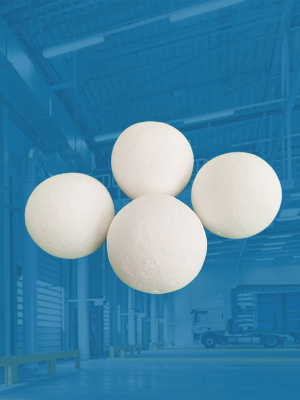Download Our Informative Brochure
Inert Ceramic Balls
Inert ceramic balls, also known as inert ceramic spheres or inert ceramic support media, are a type of industrial material commonly used in various applications, particularly in the chemical, petrochemical, and environmental industries. These ceramic balls are designed to be chemically inert and physically stable, making them suitable for a wide range of purposes.
Applications
They are commonly used as support media for catalysts in chemical and petrochemical processes. The ceramic balls provide a stable and high-surface-area support for catalysts to enhance chemical reactions. Inert ceramic balls can be used in absorption and adsorption processes, where they help in capturing or removing specific gases, liquids, or impurities from a fluid stream.

| Diameter in mm | 6 | 10 | 12 | 15 | 25 | 35 | 50 |
|
Quantity(Aprx ±10%) Nos. per M3
|
4700000 | 1100000 | 575000 | 332000 | 71000 | 25000 | 9400 |
|
Weight ( Aprx ± 10%) Kg. per M3 contact
|
1300 | 1290 | 1280 | 1290 | 1265 | 1200 | 1300 |
|
Contact surface(Aprx) M2/M3
|
425 | 315 | 240 | 210 | 128 | 85 | 65 |
|
% free space
|
45 | 45 | 45 | 46 | 46 | 48 | 45 |
FAQ's
1What are Inert Ceramic Balls?
nert Ceramic Balls are spherical ceramic components made from highly inert materials, such as alumina or zirconia. They are designed to be chemically and thermally resistant, making them suitable for a wide range of industrial applications.
2What are the advantages of using Inert Ceramic Balls?
Inert Ceramic Balls offer several advantages, including exceptional chemical and thermal resistance, high compressive strength, low thermal conductivity, and resistance to abrasion and corrosion. They are also non-reactive and non-contaminating, making them ideal for use in sensitive processes.
3What industries can benefit from using MBC Tower's Inert Ceramic Balls?
Our Inert Ceramic Balls are widely used in various industries, including chemical processing, pharmaceuticals, biotechnology, food and beverage, and environmental applications, such as water treatment and filtration.
4Can Inert Ceramic Balls be customized to meet specific requirements?
Yes, MBC Tower offers customization options for our Inert Ceramic Balls. Our team can work with you to manufacture balls with specific sizes, material compositions, and surface finishes to meet your unique application requirements.
5How should Inert Ceramic Balls be installed and maintained?
Proper installation and maintenance procedures are crucial to ensure the longevity and optimal performance of our Inert Ceramic Balls. Our team provides detailed installation guides and maintenance recommendations specific to your application and operating conditions.
6Are MBC Tower's Inert Ceramic Balls environmentally friendly?
Yes, our Inert Ceramic Balls are an eco-friendly solution as they are made from natural ceramic materials and do not contain any harmful substances or chemicals. Additionally, their durability and long service life contribute to reducing waste and environmental impact.
7What quality certifications does MBC Tower hold for its Inert Ceramic Balls?
We are committed to maintaining the highest quality standards, and our Inert Ceramic Balls are certified to meet various industry-specific quality certifications and regulatory requirements, ensuring compliance and reliable performance in demanding industrial environments.
8Can Inert Ceramic Balls withstand high temperatures and pressures?
Yes, our Inert Ceramic Balls are designed to withstand extremely high temperatures and pressures, making them suitable for use in applications such as high-temperature reactors, furnaces, or high-pressure vessel internals.
9How do Inert Ceramic Balls compare to other types of ceramic balls in terms of performance?
Inert Ceramic Balls are specifically designed to offer superior chemical and thermal resistance compared to other types of ceramic balls. This makes them ideal for use in applications where inertness and non-contamination are critical requirements.

Chandapura Road, Pashupatinath Mandir road, Mandsaur M.P. 458001 India
